The Daily Bulletin is published by Internal and Leadership Communications, part of University Communications
Contact us at bulletin@uwaterloo.ca
Submission guidelines
Editor:
Brandon Sweet
University Communications
bulletin@uwaterloo.ca
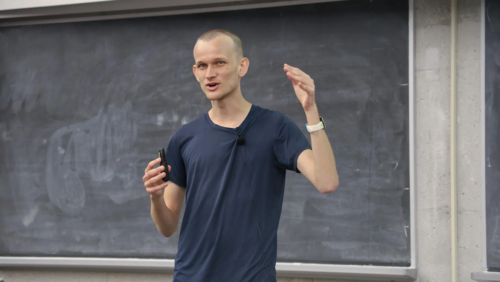
By Melodie Roschman. This article originally appeared on Waterloo News.
On Saturday, July 6, nearly two hundred students gathered for an ask-me-anything event with Vitalik Buterin, the co-creator of the Ethereum blockchain and a former University of Waterloo student.
Buterin studied computer science at Waterloo and worked as a research assistant for cryptographer and computer science professor Ian Goldberg. In 2013 he wrote a white paper proposing Ethereum. Buterin was awarded a $100,000 USD grant from the Thiel Fellowship in 2014 and subsequently left Waterloo to work on Ethereum full-time. Today, Ethereum is second only to Bitcoin in market value.
In his talk, Buterin discussed the math behind the blockchain, areas for innovation and the future of cryptocurrency. “Will crypto become the Esperanto of finance, the Linux of finance or the Internet of finance?” he asked rhetorically. “I think it depends — there are a lot of countries, particularly in the developing world, where there is a lot of demand for cryptocurrency because the traditional banking system is not effective.”
Buterin also distinguished between early-stage technologies (like cryptocurrency, AI and space travel) and later-stage technologies (like the pharmaceutical industry), arguing that early-stage technologies are an ideal space for ambitious thinking, innovation and employing pure math, engineering and science. “There’s a real focus right now on building amazing things,” he said.
“We are incredibly lucky to have Vitalik come into town to talk about Ethereum and its future roadmap,” said systems design engineering master’s student Monica Tsang. “He encouraged us to work on the optimistic, idealistic side of blockchain development instead of chasing quick money. Being a jack-of-all trades will help us learn new knowledge fast in this quickly changing blockchain space!”
Buterin emphasized the importance of shared values in technological ventures, both for practical reasons and for ethical ones. “Make sure you and your co-founders are aligned on values, both in terms of what you want to achieve in the world and also what you want to get out of the project,” he said. “Consider what kind of relationship you want to have with each other, with your investors, with your users and with your community.”
Buterin’s talk was the finale of a four-day workshop series, “Solidity 101 Bootcamp,” sponsored by De University of Ethereum, VentureMiner and the Faculty of Mathematics. The bootcamp was billed as a comprehensive educational program designed to empower the next generation of blockchain developers.
“It was such a thrill hosting Vitalik Buterin,” said Stephanie Whitney, director for Research & Innovation Partnerships in the Math Innovation Office. “The audience was blown away by how thoughtfully he outlined avenues for contributing to the blockchain ecosystem. We can’t thank him and the Ethereum Foundation enough for this amazing opportunity.”
You can learn more about Ethereum on the Ethereum Foundation website. You can learn more about the Math Innovation’s Entrepreneurship and Impact Series, including future visitors, on the Math Innovation Website.
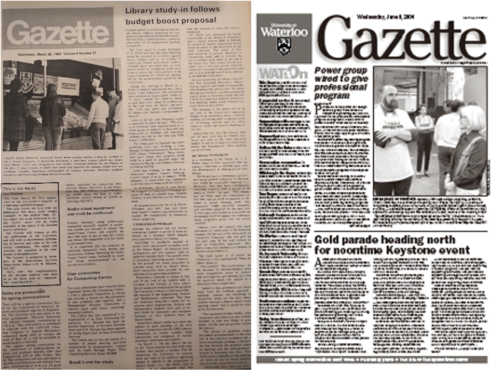
The beginning and the end: the March 26, 1969 print edition and the June 9, 2004 print edition of the Gazette.
It was twenty years ago this summer that the University published the final print issue of the Gazette, Waterloo’s institutional newspaper that ran from 1969 to 2004.
The Gazette got its start as a mimeographed internal newsletter published by the Registrar's Office in 1960, and was then taken over by the "Information Services" department, the forerunner of today's University Relations.
As the University grew in size, and as its student newspaper, first known as The Coryphaeus, then The Chevron, grew in circulation and sophistication, plans were made to turn the Gazette into a campus-wide print newspaper largely to counter the student newspaper’s coverage and critiques of the University administration. The Gazette first hit newsstands on March 26, 1969 and was published on a weekly and occasionally biweekly basis thereafter, to the tune of about 40 issues per year. Wily students caught wind of the impending institutional publication and beat them to the punch with a cheeky broadsheet dubbed the Admininews the week before the Gazette's debut that confused more than a few faculty and staff. The Gazette was circulated across campus and was available to the student body as well as employees.
It appeared weekly on Wednesdays, a schedule chosen in part to preempt the Chevron's Friday publication date.
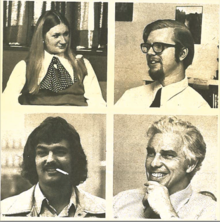 Gazette staff included (clockwise from left) Janet Rohrbach, editor Chris Redmond, Information Services Director Jack Adams, and intrepid sports reporter Mark Vincer.
Gazette staff included (clockwise from left) Janet Rohrbach, editor Chris Redmond, Information Services Director Jack Adams, and intrepid sports reporter Mark Vincer.
The Gazette was noteworthy in a number of respects - it was one of the first, if not the first, university-published newspapers in the country (as opposed to student-run newspapers, which have a longer history), and it also enjoyed a surprising degree of editorial independence, enshrined in policy, that allowed for frank commentary on issues facing the University. The Gazette proved to be a model for similar publications produced by universities across the country.
"The University's president, Gerry Hagey, had what I still think 40 years later was a brilliant idea," former Gazette editor Chris Redmond said in a speech to a gathering of university newspaper editors at Rutgers University in 2011. "Before becoming a college president, he had been a public relations executive at for B.F. Goodrich...One of the things he knew was that if you want people to believe your version of a controversial story, it helps for you to tell your version first, and tell it truthfully, and tell it in a way they can understand. So, Gerry Hagey told his communications staff to start a weekly newspaper, aimed at faculty and students and staff members, and to tell the truth in it."
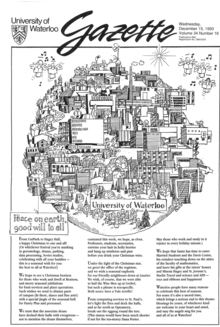 The Gazette published news about practically every aspect of the University's life, from politics to technology and sports. Its first editor was Bob Whitton, followed by Denis Grayhurst. Chris Redmond took over the position in July 1973, and would later create the Daily Bulletin, which was originally conceived as an online supplement to the Gazette. Barbara Elve became the editor of the Gazette in February 2003.
The Gazette published news about practically every aspect of the University's life, from politics to technology and sports. Its first editor was Bob Whitton, followed by Denis Grayhurst. Chris Redmond took over the position in July 1973, and would later create the Daily Bulletin, which was originally conceived as an online supplement to the Gazette. Barbara Elve became the editor of the Gazette in February 2003.
The paper and its publisher continued to evolve along with the University – Information Services became Information and Public Affairs, which later became Communications and Public Affairs or CPA for short (Communications and Public Affairs would become Marketing and Strategic Communications, and even later would be renamed University Communications within the larger University Relations portfolio. It’s a long story best told elsewhere). The Gazette grew from a simple four-page tabloid to a rather thick compendium of the week that was at Waterloo. The paper developed a lively stream of community commentary on its “letters to the editor” page, a widely-used “unclassified” section, and was the home for the weekly “positions available” listing from Human Resources, as well as PhD defence announcements and event listings. Other notable content included Jan Narveson’s decades-long “Cecilia on Music” column. By the mid-90s, the Gazette would deliver breaking news (as ‘breaking’ as one could get with a weekly publication schedule), which would be repeated and updated with supplemental information in the Daily Bulletin, but soon the situation began to reverse itself, with the Gazette's columns becoming filled with reprints of news and chatter from the previous week’s Daily Bulletins. A once-a-week publication could no longer keep up with the increased pace of life at the University.
CPA wound down the publication of the Gazette in June 2004, citing the growth in scope of the Daily Bulletin, evolving communications technology and the need to make more efficient use of resources. Communications staff pivoted to the University of Waterloo’s website as an emerging platform for institutional news, press releases, event announcements and storytelling. The "Letters to the Editor" section had a brief second life online as UW Opinion.
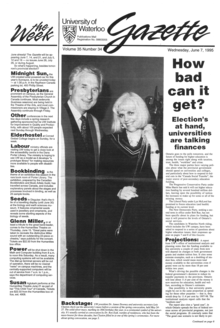 The Gazette's legacy of truth-telling and frank commentary is something of an anachronism in today's world of "brand journalism," but the Daily Bulletin kept the tradition alive under Chris Redmond's editorship. It also provided the rank and file with a form of two-way communication to let their voices and opinions, many of them contrary to the University's leadership, be heard on the editorial page. But time marches on. You'd be surprised at how many longtime employees and retirees still refer to the Daily Bulletin as the Gazette, and the weekly Wednesday job listings and PhD defence announcements remain part and parcel of the online publication.
The Gazette's legacy of truth-telling and frank commentary is something of an anachronism in today's world of "brand journalism," but the Daily Bulletin kept the tradition alive under Chris Redmond's editorship. It also provided the rank and file with a form of two-way communication to let their voices and opinions, many of them contrary to the University's leadership, be heard on the editorial page. But time marches on. You'd be surprised at how many longtime employees and retirees still refer to the Daily Bulletin as the Gazette, and the weekly Wednesday job listings and PhD defence announcements remain part and parcel of the online publication.
Today the print archives of the Gazette can be found in Special Collections and Archives in the Dana Porter Library. One of these days we’ll digitize them and open a window into the University’s past, where news you could use was only a page turn away.
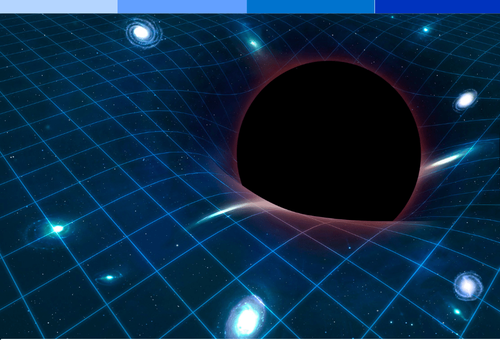
The Faculty of Science is inviting the campus community for a free physics lecture by world-renowned physicist Cliff Burgess. The Gravity of Tinkering with Einstein lecture coincides with the 50th anniversary of pioneering work in the field of gravity carried out by Dr. Gregory Horndeski in the Waterloo Mathematical Physics community.
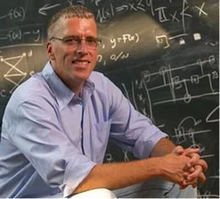 "We live at a time of contradictory messages about how successfully we understand gravity," writes Dr. Burgess in the talk abstract. "General Relativity seems to work superbly well in the Earth’s immediate neighbourhood, but arguments also abound that it needs modification at very small and/or very large distances. This talk tries to put this discussion into perspective by embedding it into a broader context: how similar situations have played out in other areas of physics."
"We live at a time of contradictory messages about how successfully we understand gravity," writes Dr. Burgess in the talk abstract. "General Relativity seems to work superbly well in the Earth’s immediate neighbourhood, but arguments also abound that it needs modification at very small and/or very large distances. This talk tries to put this discussion into perspective by embedding it into a broader context: how similar situations have played out in other areas of physics."
"I summarize some of the lessons that abundant testing of gravity in the solar system and beyond has for proponents for its modification. The main
message is mixed: Some features of gravity are easier to modify than others. But evidence from cosmology in particular seems to suggest that something is indeed missing. Better yet some features that seem to be missing also seem not to be generic to our understanding of how gravity works, and these could be crucial clues that would be silly to ignore."
The Faculty of Science will showcase some of Dr. Horndeski’s artwork that "beautifully illustrates his scientific research."
The lecture takes place on Thursday, July 16 from 6:00 p.m. to 7:30 p.m. in Federation Hall. Register today.
The Teaching Innovation Incubator is reminding people that there's still time to register for the Introduction to Creator+ workshops happening on July 18 and August 29.
"On July 18 from 1:30 p.m to 2:30 p.m. join us for a workshop on Creator+, a LEARN tool that is designed to amplify student engagement through the integration of interactive course content," says a note from the incubator. "During the workshop, you will have the opportunity to see a demo of Creator+ features and will gain access to a sandbox to get hands-on experience."
By the end of the workshop, you will be able to:
Another offering of this workshop will take place on August 29 from 11:00 a.m. to 12 noon. Registration is required.
Looking ahead to next week, SSHRC-eligible faculty members at Waterloo are invited to join experienced SSHRC Insight Grant and Insight Development Grant (IDG) merit review committee members for a panel discussion entitled Gaining Insight into SSHRC merit review: a Q&A panel with SSHRC Insight Grant and Insight Development Grant Committee Members on Tuesday, July 16 from 2:00 p.m. to 3:00 p.m.
What is SSHRC, you might ask? SSHRC stands for the Social Sciences and Humanities Research Council and is one of the three federal government research granting agencies supporting Canadian research.
The event is being billed as an online interactive virtual question and answer session. "Learn about their experience serving on their respective merit review committee and what makes or breaks an application," says the note from the Office of Research. "Advance questions are encouraged via the registration form or by email to uwsshrc@uwaterloo.ca. Questions submitted in advance will be collated and asked anonymously. There will also be opportunity to ask questions during the session. The session will not be recorded, however a summary will be posted to the SSHRC Application Resources Sharepoint site.
While we're on the subject of granting council workshops, here's another one: Exploring CIHR Project Grant Committee Culture: A Q&A panel with Reviewer Committee Members is set for Wednesday, July 17 from 1:30 p.m. to 3:00 p.m. on Microsoft Teams.
And what is CIHR, you might ask? Why, it's the Canadian Institutes of Health Research (CIHR), another one of the three granting agencies.
"CIHR-eligible researchers from the University of Waterloo are invited to join experienced CIHR Project Grant review committee members in this interactive, virtual question and answer session," says the Office of Research. "Panelists will share insights from their committee experiences and insider tips to give your application a competitive edge. Then all panelists will be available to answer audience questions. Advance questions are also welcome by emailing the UW CIHR team. The presentation will be recorded and posted to the CIHR Application Resources SharePoint site along with a summary of the question and answer period." Email the UW CIHR team to register for the session.
I checked around for an upcoming NSERC event on campus to complete the trifecta, but alas. What's NSERC, you might ask? Well, it's the Natural Sciences and Engineering Research Council of Canada and the third leg of the Canadian granting stool.
Switching gears slightly, Information Systems & Technology (IST) has published the latest entry in the Atlassian Blog Series, entitled Elevate Your Jira Experience.
The Student Health Pharmacy (located in the lower level of the Student Life Centre) is offering flu shots with no appointments needed daily from 9:30 a.m. to 3:30 p.m. Call 519-746-4500 or extension 33784 for more info. COVID shots will be available on appointment basis only. You can register online at studenthealthpharmacy.ca.
Warriors Youth Summer Camps. Basketball, Baseball, Football, Hockey, Multi-Sport and Volleyball. Register today!
Safeguarding Science workshop and more, throughout May and June. Public Safety Canada invites faculty, staff and students to attend a series of virtual event via MS Teams. Register to receive a link.
Food Truck Wednesday, Wednesday, May 8 to Wednesday, July 24, 11:30 a.m. to 2:30 p.m., Arts Quad.
WatITis 2024 call for proposals, Saturday, June 15 to Friday, August 30.
NEW - Green Labs Water Month, Monday, July 1 to Wednesday, July 31.
Chemistry Seminar, "How electron poor can we make gold(III)?" featuring Dr. Jason L. Dutton, Department of Biochemistry and Chemistry, La Trobe University, Melbourne, Australia , Friday, July 12, 2:30 p.m., C2-361 Reading Room.
Gaining Insight into SSHRC merit review: a Q&A panel with SSHRC Insight Grant and Insight Development Grant Committee Members, Tuesday, July 16, 2:00 p.m. to 3:00 p.m., virtual. Please register by July 9.
Free Public Astronomy Lecture, “The Gravity of Tinkering with Einstein” featuring Dr. Cliff Burgess, Tuesday, July 16, 6:00 p.m. to 7:30 p.m., Fed Hall. Register today.
Tim Hortons Camp Day, Wednesday, July 17.
Student Life tours, Wednesday, July 17, 11:30 a.m. to 3:00 p.m., SLC Multipurpose room.
Exploring CIHR Project Grant Committee Culture: A Q&A panel with Reviewer Committee Members, Wednesday, July 17, 1:30 p.m. to 3:00 p.m., Microsoft Teams. Email the UW CIHR team to register for the session.
WISE Public Lecture, “Keep decarbonising and carry on: what are the GB network stability challenges on our way to net zero?” by Agustí Egea-Alvarez, Associate Professor, Electronic & Electrical Engineering department, University of Strathclyde, Wednesday, July 17, 1:30 p.m. to 2:30 p.m., W.G. Davis Computer Research Centre (DC), Room DC 1302., In-person and on Zoom. Register today.
University of Waterloo Knowledge Mobilization Community of Practice, “Municipal NetZero Action Research Partnership (N-ZAP),” with Dr. Amelia Clarke, Thursday, July 18, 10:00 a.m. to 11:30 a.m. Contact Nadine Quehl to request a Teams invitation or for more information.
Invasive Species Pull, Thursday, July 18, 11:00 a.m. to 1:00 p.m., DWE parking lot.
Community Corner for Staff and Faculty from Racialized Communities, Thursday, July 18, 11:30 a.m. to 2:00 p.m.
Climate Action Event – Food as Climate Action Social with GreenHouse and Waterloo Climate Institute, Thursday, July 18, 2:00 p.m. to 3:30 p.m., United College UTC-164. Register today!
Shad Design Project Conference, Friday, July 19, 2:00 p.m. to 4:30 p.m., Great Hall, Conrad Grebel University College.
Wild Forces: University of Waterloo Choir, Saturday, July 20, 7:30 p.m., St. John the Evangelist Church, 22 Water Street, Kitchener. $5 students/$10 general
tickets available at the door.
Instrumental Chamber Ensemble concert, Sunday, July 21, 7:30 p.m., Chapel at Conrad Grebel University College. Free admission.
Student Led Individually Created Course (SLICC) Instructor Workshop: Introduction to the SLICC Framework (CTE7030), Tuesday, July 23, 1:00 p.m. to 2:30 p.m., MC 2036.
Biomedical Engineering and Technology Research Day, Wednesday, July 24, 11:00 a.m. to 12 noon, poster showcase from 1:00 p.m. to 2:30 p.m. Register on the Centre for Bioengineering and Biotechnology website by July 10 to reserve a poster space.
Afternoon Art Social for Students, Thursday, July 25, 12 noon to 2:00 p.m.
Wicked Problem of Precarity Symposium, Thursday, July 25, 12:30 p.m. to 2:30 p.m., SLC Black & Gold Room. Event details - Ticketfi.
NEW - WICI World Café and Social: Intro to Complex Systems, Thursday, July 25, 1:00 p.m. to 2:30 p.m., MC 4042 (Optional social from 3:00 p.m. to 4:30 p.m. at the Grad House).
Shad Waterloo 2024 Open Day Exhibits, Thursday, July 25, 1:30 p.m. to 4:00 p.m., Conrad Grebel Great Hall.
NeuroMinds Collective for Students, Thursday, July 25, 2:30 p.m. to 4:00 p.m. To learn more and/or to register, please contact Chris Martin.
Sweet Dreams: UWaterloo Jazz Ensemble, Sunday, July 28, 2:00 p.m., Great Hall (room 1111) at Conrad Grebel University College. Free admission.
Serenades, Ships, and Tombs: Orchestra@UWaterloo, Sunday, July 28, 7:30 p.m., Knox Presbyterian Church, 50 Erb St. West Waterloo. Free admission.
Last day of lectures and classes, Tuesday, July 30.
Pre-examination study days, Wednesday, July 31 and Thursday, August 1.
NEW - WICI Workshop: People Need People – A Warm Data Lab Approach, Thursday, August 1, 9:00 a.m. to 12 noon, online via Zoom.
Knowledge Gathering and Sharing Consultation Sessions: 2STNBGNC+ allies who are employees (staff and faculty), Tuesday, August 6, 4:00 p.m. to 6:00 p.m., virtual. Register.
Knowledge Gathering and Sharing Consultation Sessions: 2STNBGNC+ allies who are employees (staff and faculty), Wednesday, August 7,11:30 a.m. to 1:30 p.m., in person. Register.
Safeguarding Science: Raising awareness of security risks and mitigation tools in the research ecosystem, Wednesday, August 7, 1:00 p.m. to 2:30 p.m.
Ontario Mennonite Music Camp, Sunday, August 11 to Friday, August 23.
NEW - WICI Speaker Series: Embracing Complexity in Sustainability Transitions with Dr. Enayat Moallemi, Monday, August 19, 10:00. a.m. to 11:30 a.m., DC 1302.
Combinatorics and Optimization. Sepehr Hajebi, "Foreshadowing the Grid Theorem for Induced Subgraphs." Supervivsor, Dr. Sophie Spirkl. Thesis available from MGO - mgo@uwaterloo.ca. Oral defence Tuesday, July 16, 9:00 a.m., hybrid.
Pure Mathematics. Christopher James Lang, "Solitons with continuous symmetries." Supervisor, Dr. Benoit Charbonneau. Thesis available from MGO - mgo@uwaterloo.ca. Oral defence Thursday, July 18, 8:30 a.m., hybrid.
Physics and Astronomy. Katarzyna Budzik, “Examples of Twisted Holography in B-model.” Supervisors, Dr. Jaume Gomis, Dr. Davide Gaiotto. Please visit the Faculty of Science Thesis Submission Notices website for details on requesting a copy. Oral defence Friday, July 19, 8:30 a.m., remote via MS Teams.
Management Science and Engineering. Danielle Atara Ripsman, "Structural Approaches to Large-Scale Optimization for Radiation Therapy." Supervisor, Dr. Houra Mahmoudzadeh. Thesis available via SharePoint, email eng.phd@uwaterloo.ca to request a viewing link. Oral defence Friday, July 19, 10:00 a.m., CPH 3623.
Stay up to date on service interruptions, campus construction, and other operational changes on the Plant Operations website. Upcoming service interruptions include:
EV1 1st floor power interruption, Monday, July 22, 6:00 a.m. to 8:00 a.m., most lights and receptacles will be without power for approximately 2 hours.
ESC building electrical shutdown, August 24, 6:00 a.m. for 14 hours, building will be closed, all power to ESC will be shut down, elevators will not be functional.
The Daily Bulletin is published by Internal and Leadership Communications, part of University Communications
Contact us at bulletin@uwaterloo.ca
Submission guidelines
The University of Waterloo acknowledges that much of our work takes place on the traditional territory of the Neutral, Anishinaabeg, and Haudenosaunee peoples. Our main campus is situated on the Haldimand Tract, the land granted to the Six Nations that includes six miles on each side of the Grand River. Our active work toward reconciliation takes place across our campuses through research, learning, teaching, and community building, and is co-ordinated within the Office of Indigenous Relations.